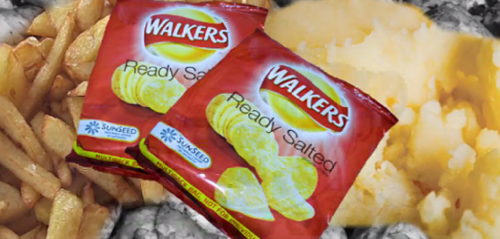Following Potatoes through the season
Potatoes Background

Potatoes (Solanum tuberosum) provide a high yield from their roots or tubers which contain carbohydrate and protein. The potato puts these nutrients in their roots as a store from which they can grow a new plant. These potatoes are referred to as ‘seed’ potatoes which is not strictly true as the seed of a potato comes from small green berries called potato apples which appear on plants after they have flowered. These potato apples are not usually seen.
Seasonality of Potatoes
Potatoes are partly seasonal with the New Potatoes we know and love being only really available during the summer as they don’t store well for long once harvested. Other main crop potatoes can be successfully stored almost until the next years crop is harvested. So we don’t really need to import ‘fresh’ potatoes as our are fresh if stored carefully.
Potato crops are divided into Earlies and Main which refers to when they are generally harvested. The Earlies are the new potatoes we all love.
The main crop potatoes are what normally provide all the other food we get from potatoes such as chips (which are not actually bad for you if they are eaten as part of a balanced diet), mash, crisps etc.
The plant, which is sown in the spring, grows quickly and the tubers can be harvested throughout the summer and autumn months.
The crop production cycle below is generally that of main crop potatoes.
Late Autumn to Early Spring
Preparing field for potatoes.
Potatoes need a lot of fertilizer to get a good economic yield. Various forms of fertilizer are used depending on what is available. If the farm also keeps animals then their dung maybe used – this is called Farm Yard Manure (FYM). If FYM is not available then a specially formulated suspension fertilizer maybe applied.
The fertilizer can also be applied at different times; FYM is usually applied and ploughed in as it needs to ‘rot down’ like compost to release it’s nutrients for the potatoes. Liquid fertilizer is usually applied after ploughing as it does not need to decompose.
Spring
Planting Potatoes.
Once the farmer is happy with the seedbed then the potato tubers are planted in rows. This is done once the land has warmed up in the spring. Watch planting in video player above.
Late Spring – Early Summer
Keeping Potatoes Healthy
Potatoes like any other arable crop are susceptible to pests and diseases. The Irish Potato Famine was caused by the potato disease blight. This can still be a problem today so farmers must spray against blight every 10-14 days if conditions are suitable for its spread during the summer.
Irrigating Potatoes
Potatoes are one of the few crops in this country which respond well to irrigation and which produce an economic benefit to cover the cost of irrigation.
Water is pumped, either from a bore hole or pond which collects rain water, along pipes to the irrigator. The irrigator is a clever piece of machine which uses the water flow to real in the irrigator gun watering the crop as it does so. The electronics in the machine are solar powered too.
The farmer needs to move the irrigator once the real has wound all the way in. The amount of water put on can be regulated depends on the amount of rain the crop has received. Potatoes are very thirsty so even if it has rained you may still see them being irrigated.
Late Summer – Autumn
Harvesting Potatoes
Potatoes are now all harvested with machines which lift them out of the ground and separate them from the soil. Care must be taken during lifting to not damage the potatoes as this can result in them rotting if they are stored for any length of time. Some potatoes once lifted will be stored all winter in special stores which keeps the temperature ideal for the purpose.
Uses of potatoes.
I’m sure you are all aware of the uses of potatoes – especially crisps and chips which are supposed to be BAD for you, well as part of a healthy balanced diet they are fine to eat.
Some potatoes are sold straight off the farm for further processing for crisps etc or to pack as Baked Potatoes etc.
The video also shows potatoes being graded, sorted and packed into 25 Kg bags to go to Fruit and Veg shops or Super Markets.